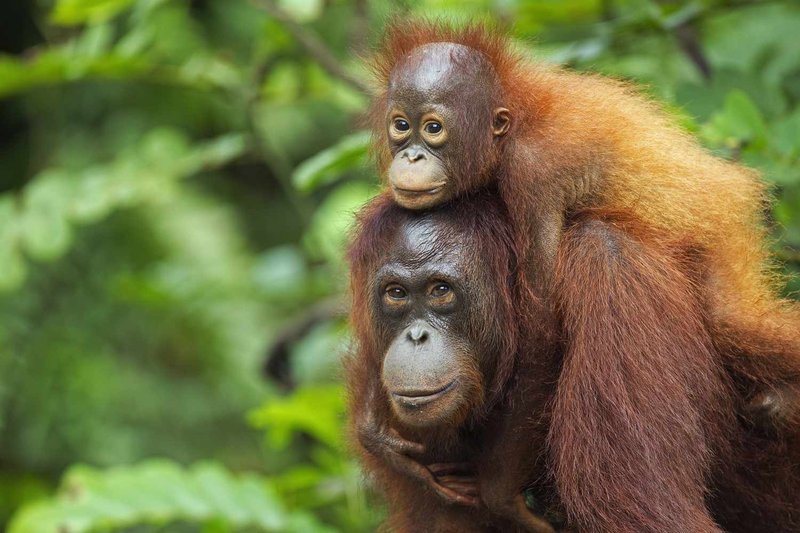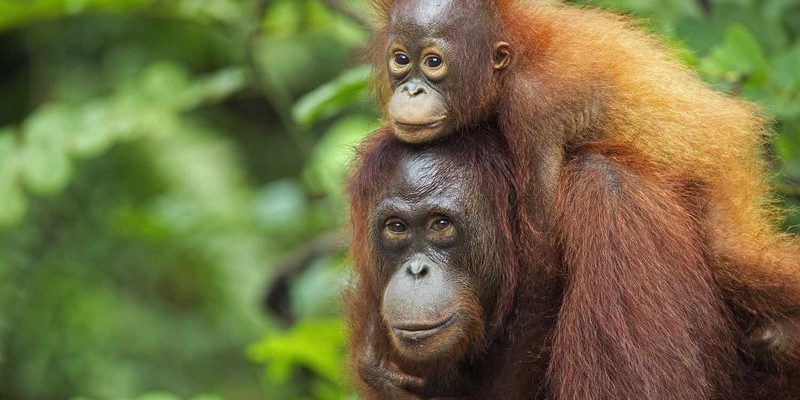
So, what’s behind this grim reality? It all boils down to habitat loss, poaching, and other human activities. Let me explain the situation surrounding the Bornean orangutan, why it’s essential we pay attention, and what can be done about it. In this article, we’ll dive into the challenges faced by this magnificent animal and take a closer look at global conservation efforts.
What Makes the Bornean Orangutan Unique?
The Bornean orangutan is one of our closest relatives in the animal kingdom. Sharing about 97% of our DNA, they possess remarkable intelligence and social behaviors that are strikingly similar to humans. Unlike other primates, Bornean orangutans have a distinctive reddish-brown fur, long arms, and a knack for using tools—a feature that truly sets them apart.
Their habitat, primarily found in the dense tropical forests of Borneo, plays a crucial role in their lifestyle. These towering trees provide both shelter and food, allowing them to thrive in a rich ecosystem. They mainly feast on fruits, leaves, and bark, making them vital for seed dispersal in their environment. It’s fascinating to think that when an orangutan eats a fruit and drops the seeds, it contributes to the forest’s regeneration.
But here’s the thing: this unique behavior is under threat. As deforestation and land conversion for agriculture increase, the forests that Bornean orangutans depend on are shrinking rapidly. Picture a once-vibrant neighborhood being replaced by concrete buildings. That’s what’s happening to their homes, and it’s not just sad—it’s dangerous for their survival.
Why Is the Bornean Orangutan Endangered?
The categorization of the Bornean orangutan as endangered is no mere label; it’s a call for urgent attention. A staggering estimate suggests that between 1990 and 2010, the population of Bornean orangutans decreased by around 60%. Why? Several factors play into this alarming decline.
Firstly, deforestation is the primary culprit. Unsustainable logging, palm oil plantations, and agricultural expansion are all leading to significant habitat loss. Imagine being forced out of your home because someone wanted to build a farm or a factory. It’s unsettling, and it’s exactly what these incredible creatures are facing.
Secondly, poaching and illegal wildlife trade pose a significant threat. Though orangutans do not have many natural predators, human interference has become a major concern. Some individuals fall victim to illegal hunting, while others are taken for the exotic pet trade. This not only threatens their numbers but also disrupts their social structures, as mothers and young ones are often separated.
Lastly, the impact of climate change cannot be ignored. Rising temperatures and changing weather patterns affect food availability and habitat conditions. It’s like trying to cook a favorite recipe, but your primary ingredients have gone missing. The result? A struggle for survival.
Global Conservation Efforts in Action
Now that we understand the threats, let’s look at how the world is stepping up to protect the Bornean orangutan. Several organizations and governments are working tirelessly to ensure these remarkable creatures have a fighting chance.
One significant initiative is the Borneo Orangutan Survival Foundation (BOSF). Their work focuses on rehabilitating orphaned orangutans and reintroducing them into the wild. Picture a nurturing environment where young orangutans learn survival skills with the guidance of caregivers. This not only helps individual animals but also strengthens the wild population.
Moreover, community engagement is vital in conservation efforts. Local communities are often on the frontlines of protecting orangutans, and raising awareness about their plight is essential. When people understand the importance of preserving their natural habitat, they’re more likely to contribute to conservation efforts. Educational programs and eco-tourism initiatives can create financial incentives for protecting forests instead of converting them into plantations.
Lastly, international cooperation plays a key role. Agreements like the Convention on International Trade in Endangered Species (CITES) help regulate and reduce illegal wildlife trade on a global scale. By working together, countries can make significant strides in protecting endangered species, including the Bornean orangutan.
What Can You Do to Help?
You might be wondering how you can contribute to the conservation of the Bornean orangutan from wherever you are. Here are a few simple yet impactful ways to get involved.
– Support Sustainable Products: Whenever possible, choose products that are certified sustainable, like palm oil sourced from responsible growers. This helps reduce the demand for unsustainable practices that destroy orangutan habitats.
– Raise Awareness: Share what you learn about the Bornean orangutan and its challenges. Social media can be a powerful tool to spread awareness and encourage others to care about wildlife conservation.
– Contribute to Conservation Groups: Consider donating to organizations that focus on orangutan conservation. Every little bit helps, and your contribution can support critical projects on the ground.
– Adopt an Orangutan: Some organizations offer adoption programs where you can ‘adopt’ an orangutan. Your donation supports their care and contributes to their rehabilitation efforts.
By taking small actions in your daily life, you can help make a big difference in the fight to save the Bornean orangutan.
The Road Ahead for the Bornean Orangutan
The future of the Bornean orangutan hangs in a delicate balance. While there are significant challenges ahead, the progress made by conservationists offers hope. The more we understand and advocate for their protection, the brighter their future can be.
Imagine a future where these incredible creatures can roam freely through lush forests, play among the branches, and continue their vital role in the ecosystem. It’s a vision worth fighting for.
In conclusion, the story of the Bornean orangutan is one of resilience and vulnerability. While they face overwhelming threats, collective efforts can create a brighter future. Whether it’s supporting conservation initiatives or simply sharing awareness, every action counts. Together, we can help ensure that future generations will be able to appreciate the beauty and wonder of the Bornean orangutan.

